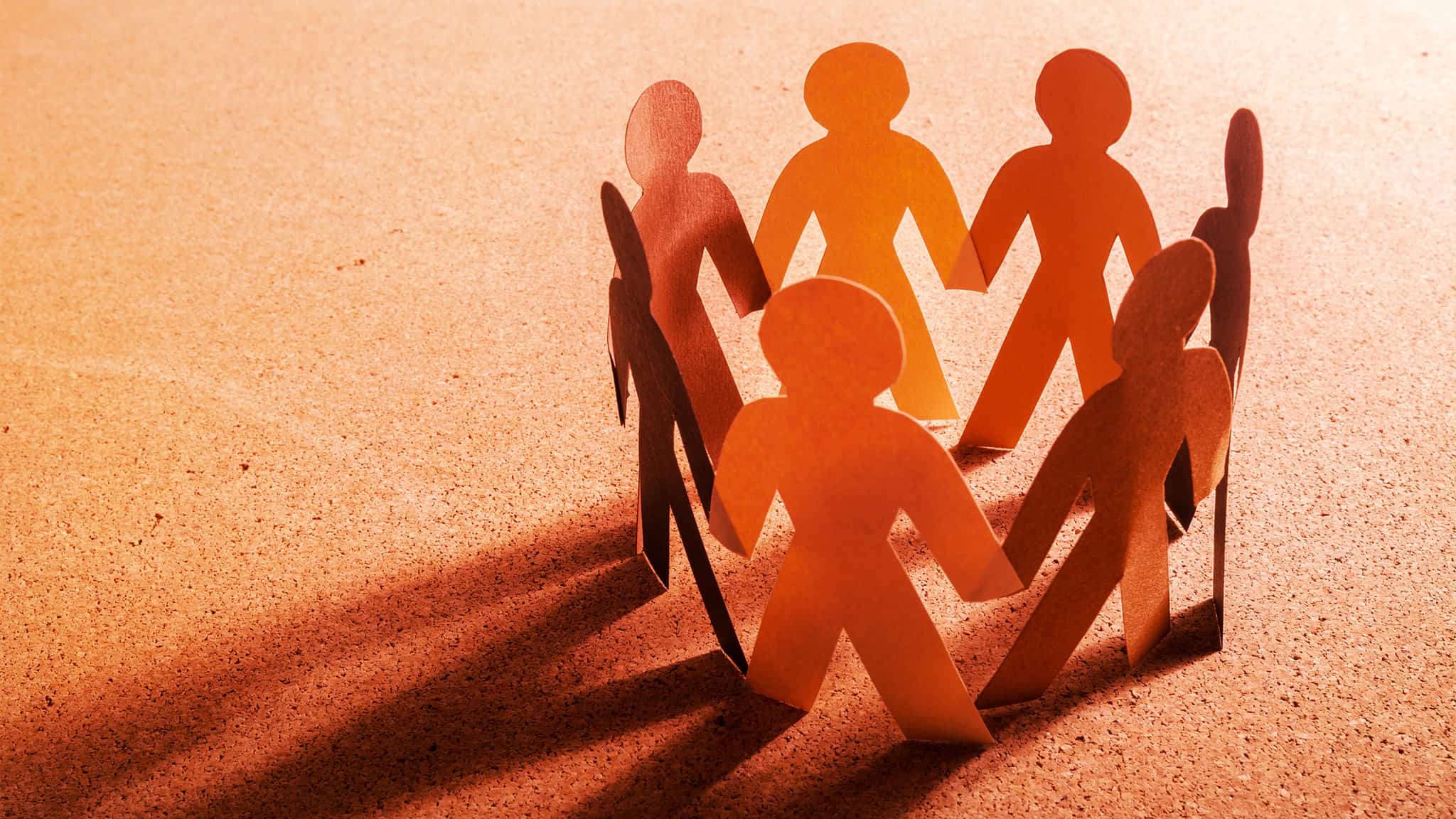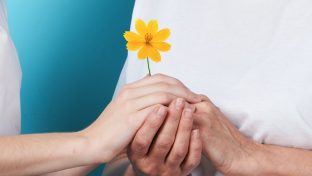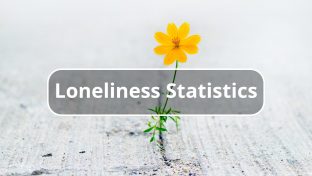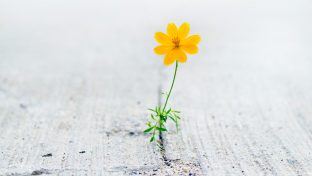Resources And Help For Crises, Mental Health, And Loneliness

Whether you’re in crisis right now or you simply want to feel less lonely in your day-to-day life, these resources can help.
Loneliness affects us all in different ways and occurs for a lot of reasons.
These resources can also be helpful if someone you love is exhibiting signs of distress, loneliness, and isolation, as well.
→ Click on any of the below for quick access to:
- Crisis Hotlines/Immediate Help
- Resources For Loneliness
- Resources For Lonely Seniors
- Resources For Lonely Children And Teens
- Resources For Lonely Veterans And Active Duty Military
- Resources For People With Disabilities And Chronic Conditions
- Loneliness Resources For Mental Illness
- Volunteering Resources To Reduce Loneliness
- Pet Adoption Resources To Reduce Loneliness
Crisis Hotlines — If You Need Help Right Now:
- Suicide Prevention Lifeline: The Suicide Prevention Lifeline is free and available any time, day or night, at 1-800-273-TALK (8255).
- If you are Deaf or hard of hearing, you can call that same number using a TTY through your preferred relay service, by dialing 711 before the number, or connect via online chat.
- Crisis Text Line: The National Alliance on Mental Illness (NAMI) has a 24/7 crisis text line available. A counselor can be reached immediately by texting HOME to 741741. This service is free for AT&T, T-Mobile, Sprint, and Verizon; standard text rates apply for other carriers.
- Veterans Crisis Line: Available 24/7, the Veterans Crisis Line is free and can be reached at 1-800-273-8255 (press 1), by texting 838255, or through online chat.
- National Domestic Violence Hotline: Available 24/7, call 1-800-799-SAFE (7233) by phone or 1-800-787-3224 by TTY. Live online chat is available or you can also text START to 88788. Standard text messaging rates apply.
- Childhelp National Child Abuse Hotline: Call or text 1-800-422-4453 or chat online. Calls and online chats are free; standard text message rates may apply.
- RAINN: The Rape, Abuse & Incest National Network (RAINN) is free and available 24/7 at 1-800-656-HOPE (4673) or through online chat.
- SAMHSA’s National Helpline: Available 24/7, the Substance Abuse and Mental Health Services Administration’s helpline can be reached at 1-800-662-HELP (4357) by phone or 1-800-487-4889 by TTY. An online tool is also available. If you prefer to text, you can text your five-digit zip code to 435748 (HELP4U). Message and data rates may apply.
- Disaster Distress Helpline: Available 24/7 for mental health support following a disaster, call or text 1-800-985-5990 (including ASL support via videophone). Standard text messaging rates apply.
- National Grad Crisis Line: Available 24/7 at 1-877-GRAD-HLP (1-877-472-3457), the National Grad Crisis Line is a free hotline that connects graduate students with counselors trained in crisis intervention, suicide prevention, and general counseling with resources for support and mental health.
Resources And Emotional Support For Loneliness
- Psychological First Aid Online Course: The Red Cross developed a free Psychological First Aid online course to help you recognize mental health crises and stress within yourself or your loved ones.
- Commit to Connect Program: The Administration for Community Living (ACL) developed the Commit to Connect program during the height of the COVID-19 pandemic to help combat and reduce social isolation and loneliness among people from all walks of life.
- The Lonely Hour: If you simply want to feel less alone in life, check out the Lonely Hour Podcast. The host, Julia Bainbridge, wants to both de-stigmatize loneliness and celebrate the potential joy of solitude.
- Loneliness Related To Substance Abuse Or Mental Health: The Substance Abuse and Mental Health Services Administration operates a 24/7/365 national hotline that offers treatment referrals and information at 1-800-662-HELP (4357) and an online tool. If you prefer to text, you can text your five-digit zip code to 435748 (HELP4U).
- Loneliness Related To Trauma: The Trauma Foundation offers a page of resources to help people deal with unresolved trauma, whether it occurs in childhood or later in life. Trauma and its effects can often lead to loneliness and isolation.
- Loneliness Related To Grief: Grieving loss – of any kind – can lead to isolation, loneliness, and unresolved feelings. What’s Your Grief is a website devoted help you navigate your grief and the loss you’ve experienced.
- Meetup: If you’re looking to build connections with others, Meetup.com provides an opportunity to meet people (face-to-face) who share your interests.
Resources For Lonely Seniors
- Friendly Voice Program: Sometimes all you need is to hear a friendly voice to feel less alone. Sign up for AARP’s Friendly Voice program by calling 1-888-281-0145 or 1-888-497-4108 for Spanish. A trained AARP Friendly Voice volunteer will call you back and chat with you — for free.
- Connect2Affect: Social isolation is a common problem among seniors. Connect2Affect offers a free resource page to help end that isolation. You can take assessments to determine your risk for isolation and find free or reduced-cost services that will help prevent loneliness and isolation.
- Big And Mini: A large part of loneliness for many older people is no longer feeling needed or relevant. Big and Mini is a free program that connects seniors to young people so that each can learn from the other. Take the online training, answer a few questions, and get matched with a younger person to talk to.
- Eldera: Another free program creating connections between seniors and kids, Eldera provides the opportunity to talk to and learn from each other. You’ll help the newest generation thrive and give them the benefit of your knowledge and experience while also having a renewed sense of purpose for yourself.
- LGBTQ+ Seniors: SageConnect is an opportunity for LGBTQ+ seniors to connect over the phone (for free) to reduce loneliness. You’ll know you’re accepted for who you are and help reduce loneliness and isolation.
- AmeriCorps Seniors: Another option for reducing loneliness, decreasing isolation, and renewing your sense of purpose is volunteering. AmeriCorps Seniors is designed specifically for volunteers age 65 and older to help you use your skills and talents to help others.
- Little Brothers – Friends of the Elderly: LBFE offers multiple programs to help alleviate loneliness and social isolation for seniors from one-on-one meetings, social gatherings, and even tech education. The program is free through the help of volunteers and is currently available in New York, Boston, Chicago, San Francisco, Upper Michigan, and Cincinnati.
- Friendship Line: The Institute on Aging offers a Friendship Line for seniors who could use a friendly voice to talk to. The line also serves as a crisis hotline for seniors. Dial 1-800-971-0016 for toll-free help 24 hours a day.
- Meals On Wheels: You may know Meals On Wheels as a food service program combatting hunger in seniors around the country. Part of what they provide, as well, is a point of connection for lonely elders who may not see a friendly face except during their deliveries.
Resources For Lonely Children And Teens
- Boys Town: Boys Town, an organization devoted to helping children and families, provides the Boys Town National Hotline for young people in crisis. Kids and parents can get help by calling 1-800-448-3000 for free or texting VOICE to 20121 (standard text messaging rates may apply). The hotline is staffed by trained counselors and is accredited by the American Association of Suicidology (AAS).
- Teen Line: Teen Line is a hotline and program designed to help teens struggling with their mental health. It provides support, resources, and hope with the help of professionally trained counselors. Teens can call 1-800-852-8336, 6:00pm to 10:00pm PST or text TEEN to 839863, 6:00pm to 9:00pm PST (standard text messaging rates may apply). Email is also available.
- Kids In Crisis: A 24/7 hotline is free and available for children, teens, parents, family members, therapists, and other professionals who suspect a child is in trouble and needs help. Trained Crisis Counselors at Kids in Crisis offer resources and support when you call 1-203-661-1911.
- Child Help Hotline: The Child Help Hotline offers online resources for children, teens, and adult survivors of child abuse. If you need immediate help and a friendly voice, survivors can call or text 1-800-422-4453 or chat online.
- Boys & Girls Club Of America: Loneliness among children and teens, much like seniors, can come from social isolation and lack of time spent in an accepting environment with their peers. The Boys & Girls Club Of America offers free afterschool and summer programs for children and teens.
- Dougy Center: Offers free grief support for children and teens as well as resources for kids, parents, and caregivers to help their kids navigate all the feelings that come with grieving a loss, including isolation, loneliness, and fear.
- The JED Foundation: Provides free mental health and emotional support for teens who are struggling.
- Stop Bullying: For adults and children, Stop Bullying provides a variety of free resources for dealing with bullying of all kinds, including cyberbullying.
Resources For Lonely Veterans And Active Duty Military
- Veterans Crisis Line: Veterans have unique experiences that can lead to loneliness and develop into crises for them and their loved ones. The Veterans Crisis Line gives you access to help by phone, text, or online chat. You do not have to have VA benefits or healthcare to gain access. Call 1-800-273-8255 and press 1 or text 838255.
- Make The Connection: No one but another veteran can ever understand what you’ve experienced. If this leaves you feeling isolated, let Make the Connection help. They have hundreds of videos across every branch of the military of veterans just like you sharing their stories. The site also offers resources so you can get the assistance you need as a veteran.
- Soldiers Angels: Being an active-duty soldier or veteran can be difficult at different stages of life. Soldiers Angels offers programs for veterans and military members in need. You can register online to receive support (including tech access) during deployment, pregnancy, while raising infants or children, and more.
- Wounded Warrior Project: The Wounded Warrior Project offers resources for wounded veterans who need assistance across multiple aspects of life including mental health and well-being.
- The Veterans of Foreign Wars (VFW): Offers resources, help, and volunteer opportunities as part of their VFW Mental Wellness Campaign. Their goal is to reduce veteran suicides and the stigma around mental health.
- Warrior Canine Connection: Providing mission-based trauma recovery through the training of service dogs, the Warrior Canine Connection program helps veterans suffering from PTSD and other psychological injuries.
Loneliness Resources For People With Disabilities And Chronic Conditions
- Daily Strength: Offers online forums, support groups, and crisis resources for people with disabilities. The idea behind Daily Strength is to connect with others who understand what you’re going through and offer each other a sense of community and support.
- Healing Well: Provides free chronic illness support forums to help answer your questions and provide a source of connection and community with others who understand what it’s like to live with a chronic illness.
- Programs 4 People: Provided by the Invisible Disabilities Association (IDA), Programs 4 People offers a variety of resources to those struggling with debilitating conditions.
- Easter Seals: Offering a variety of programs and resources for caregivers and those in need of care, Easter Seals is a national organization that serves the needs of Americans living with a disability.
Loneliness Resources For Mental Illness
- NAMI: The National Alliance on Mental Illness (NAMI) offers a crisis hotline but also provides support groups for individuals with mental illness and family support groups.
- Mental Health Is Health: This is an “MTV Entertainment Group initiative to…normalize the conversation, create a connection to resources and inspire action on mental health.” You can use Mental Health is Health to check in with yourself or help a friend.
- Mental Health America: Offers the Live Your Life Well program to help combat the stress, loneliness, and negative feelings that mental illness can cause. MHA also offers an online support group to help you feel less alone and online mental health screening to help you start the process of getting the help you need.
Reduce Loneliness By Volunteering
Volunteering is an excellent way to make friends, find purpose, give back to your community, and feel less isolated.
Volunteer opportunities exist in every community and for all skill levels.
Volunteer Match helps people to find volunteer organizations in their local area, broken down by interest. Opportunities can be filtered by in-person or virtual (online) volunteering.
If you can’t find what you’re looking for at Volunteer Match, check out this list of national organizations that can connect you to volunteer opportunities in your area:
- Humane Society
- ASPCA
- TeenLife
- Feeding America
- Volunteers of America
- United Way
- Americorps
- Little Brothers — Friends Of The Elderly
- Meals On Wheels
Reduce Loneliness With Pet Adoption
Surveys have shown that owning a pet can drastically reduce loneliness for people of all ages.
Over 6 million stray animals enter pet shelters across the US each year and need a loving home.
If pet care and ownership are accessible for you, you can find a pet in need in your local area at the sites listed below:
Conclusion
Feelings of loneliness rob us of joy and can make the days feel impossible to endure.
Online groups and resources are out there, all with the goal of helping us connect with each other.
Take the first step by using these resources. You’re not alone, no matter how lonely you may feel.






